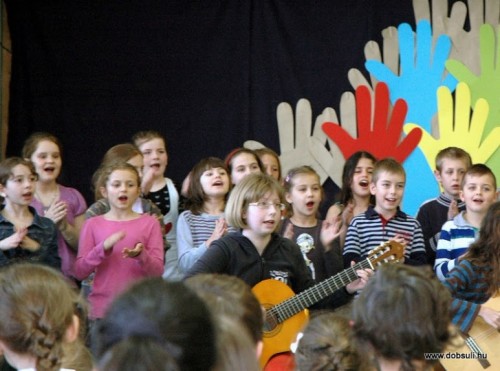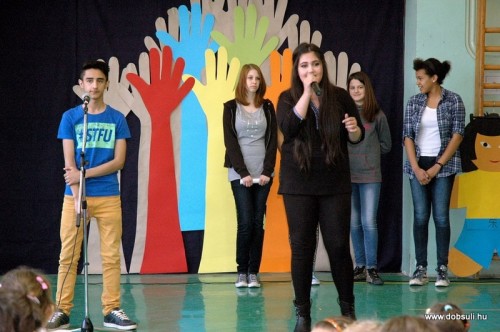24th April 2014 Budapest, Hungary
"All the world’s a stage…"
Yesterday we celebrated St George’s day in the UK. To celebrate, I was invited to a small Byzantine church surrounded by olive groves by my Greek friend Georgios – and afterwards to eat sweets and almonds.
On April 23rd we celebrate St George as patron saint of England, but he is also celebrated in a number of other countries from Russia to Ethiopia and of course, Greece from where I am writing this blog and celebrating these anniversaries this year.
St George is obviously a multi-cultural saint. Earlier this month I was invited to attend a multicultural programme, held annually at the Erzsébetvárosi Kéttannyelvű Általános Iskola, (Dobsuli) in Budapest’s District 7. It’s worth telling something of this school’s story. It has been a bilingual school for the last 20 years receiving students from many different countries. Currently there are children from 13 different countries as well as Hungarian children, many from the Roma community. This makes it perhaps the most multicultural, multilingual school in Budapest. The programme I saw showed a lot of creativity. In one sketch, which centred around a carrot that everyone in the community – from grandfather to mouse – tried to pull out of the ground, eight languages were spoken.

Dobsuli was one of the first schools in Hungary to include in its pedagogical programme acceptance of difference, support for students with learning difficulties and provision of equal opportunities. Diversity, flexibility, shared experience, promotion of solidarity and integration are at the heart of their value system. Amongst their core principles, there are those which one can easily relate to; learning by doing, parental participation in school work and providing a safe environment for physical, mental and the emotional development of the student. The British Council has worked closely with this school for a good many years – most recently on our Connecting Classrooms programme, which has brought together schools from Hungary, Wales, France and Romania through sharing experiences of the curricula, a programme which demonstrates the benefits of the internationalising of education.

If St George has broad trans-continental appeal, then Shakespeare is most assuredly a global cultural icon. The anniversary of his birth AND death is celebrated on 23rd April. In this 450th birth anniversary year there is considerable activity, not least in Hungary. The British Council has been partnering with the Uránia Theatre to bring Globe on the Screen, and therefore Shakespeare to audiences in more than 15 Hungarian cities. NT Live has also broadcast some magnificent performances of Shakespeare from London. We have had a rich diet of plays, from the Tempest and Julius Caesar to Hamlet and Othello, and recently run workshops for English teachers using the Globe’s all-male-cast production of Twelfth Night as a basis for developing classroom material. In Germany, at Neuss HOPPart of Hungary will be putting on an adaption of Coriolanus. In Paris a conference spotlighted ‘Shakespeare during the Cold War’ and focussed on Hungary in 1976 , a year when major theatres throughout the country put on Shakespeare plays with nine shows premiering and Hungarian cultural politics much in evidence. In Budapest, the Hungarian Shakespeare Society have organised a full programme at the Uránia Theatre on 23 April to commemorate the great Bard.
As Shakespeare himself would say: All the world’s a stage…
The views and opinions expressed in this article are those of the authors and do not necessarily reflect the official policy or position of the British government.